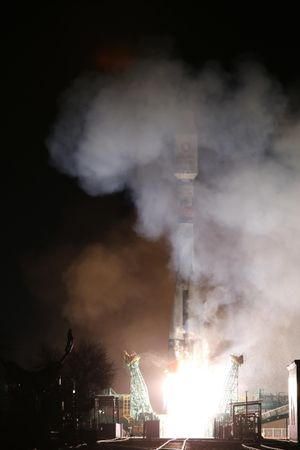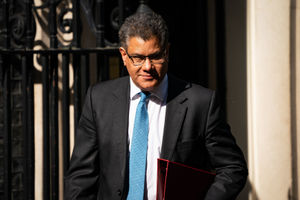Does Britain have what it takes in the space race?
Fifty years ago today, the rocket Black Arrow attempted to launch Britain’s first satellite. The mission failed, but the following year Britain became the sixth nation to place a satellite in orbit through a home-produced rocket.
Half a century on, Britain is back in the space race, although you probably won’t have noticed.
While the nation has been gripped with the coronavirus, the Government’s £382 million purchase of a 45 per cent stake in the bankrupt satellite company OneWeb has quietly slipped under the radar.
Business Secretary Alok Sharma says the acquisition of the company, which plans to fill an area of space with hundreds of small satellites, underlines the scale of Britain’s ambitions.
At its most basic level, the Government hopes the company’s technology will once and for all end the blight of poor broadband connections in rural areas, something that will certainly go down well with businesses in some of the more remote parts of this region. There are also plans to create Britain’s own sat-nav system to rival America’s GPS, and the European Union’s Galileo system.
But while the rewards could potentially be huge, concerns have also been raised about the high-risk nature of the investment. In the run-up to the purchase of OneWeb, Sam Beckett – the business department’s most senior civil servant – wrote to Mr Sharma warning that if the project did not succeed, all the money could be lost.
In her letter, Mrs Beckett wrote that she understood potential long-term geopolitical benefits that would come with ownership of a fleet of satellites, as well as the potential benefits for UK global interests.
“It would be the first mega-constellation operator, and would have the potential to connect millions of people, especially those in remote rural locations without broadband access,” she said.

But Mrs Beckett said the project came with “considerable uncertainties”, and was an “unusual” purchase for the Government given the pioneering nature of the technology. She said in a best case scenario, the investment could net a 20 per cent return, but in the worst-case all the money invested could be lost.
“There is a very broad range of uncertainties and possible outcomes, so it is very hard at this time to be confident in the underlying assumptions or the likely returns,” she wrote, adding that more government funds may be needed.
The Prime Minister’s adviser Dominic Cummings is believed to be the driving force behind the acquisition, and if Britain is serious about re-entering the space race, there is a certain logic in buying into an established company that already has 70 satellites in space rather than funding years of costly development.
The company was founded by American Greg Wyler in 2012 under the name WorldVu, and was registered in the Channel Islands. In 2015, OneWeb secured funding worth half a billion US dollars, and agreed to purchase future launch services from existing aerospace industry companies Arianespace and Virgin Galactic. In June that year it also entered into a deal with Airbus Defence and Space to build a factory in California manufacturing broadband internet satellites.
Based out of a former BBC building in West London, the company planned to fill an area of space known as Low Earth orbit, about 700 miles away.
The proposal was to initially launch 648 small satellites, each about the size of a washing machine.
These would have been used to beam high-speed internet services to the remote parts of the world.

But in March the company filed for bankruptcy, blaming the coronavirus pandemic. The UK Government, in partnership with India’s Bharti Global corporation, which is also taking a 45 per cent stake, managed to outbid rivals.
Bharti will provide the company commercial and operational leadership, and bring OneWeb a revenue base to contribute towards its future success.
Mr Sharma says: “This deal underlines the scale of Britain’s ambitions on the global stage.”
There is another reason why Britain has rejoined the space race.
While the European is developing its own £9 billion rival to the US GPS system, the UK has been barred from using it for military purposes as a result of Brexit. It was originally hoped the UK would develop its own system from scratch, but at £5 billion – although defence chiefs are said to be concerned about its effectiveness when out to use. .
Shortly after launching Britain’s first satellite, Ted Heath’s government pulled the plug on the Black Arrow project, concluding the rocket business was too risky, too expensive, and best left to the Americans.
Now, almost 50 years later, Britain once more has a horse in the race.
Only time will tell whether it proves to be a thoroughbred or an also ran.





